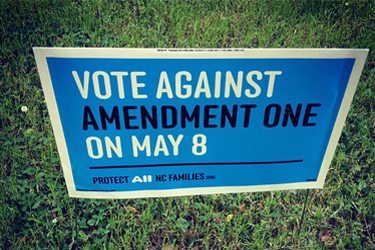North Carolina: Marriage Rights (but Not Equal Rights) on the May 8th Ballot
North Carolina polls are open for early voting in the primary election, and the rights of unmarried couples are being put to a public referendum.

North Carolina polls are open for early voting in the primary election, and the rights of unmarried couples are being put to a public referendum.
I voted against North Carolina’s Amendment One, which seeks to amend the state constitution “to provide that marriage between one man and one woman is the only domestic legal union that shall be valid or recognized in th[e] state.”
A recent Pew poll shows that nationally support for gay marriage is higher than ever —47 percent of Americans in favor of it; 43 percent opposing — but North Carolinians have tended to be less progressive on the issue. When Amendment One was introduced last September, public opinion polls reported that only 31 percent of North Carolinians were in favor of legalizing gay marriage, and 61 percent favored keeping it illegal.
The fate of the amendment to ban civil unions and gay marriage will be decided on May 8th, the official primary election day. Already at least one lawmaker, who played a critical role in getting the amendment on the ballot, has changed his mind about supporting it.
State Representative James Crawford was one of ten Democrats who supported putting the measure on the ballot. He has since said publicly he will vote against the amendment, it goes too far, amid impassioned outcries from constituents in the gay community.
Public opinion on the amendment is also changing, and advocates seeking to prevent the amendment’s passage are gaining ground. A new poll released last week shows:
- 53 percent of North Carolina voters support either marriage or civil unions for gay couples; 44 percent oppose the recognition of same-sex unions.
- 40 percent of North Carolina voters now report opposing the amendment, while 54 percent plan on supporting it.
However, support for same-sex unions does not directly align with opposition to the constitutional amendment, which may reflect voters’ confusion over what Amendment One actually does. Polls suggest that only 36 percent of North Carolina voters understand the amendment’s aim, which is to ban civil unions and gay marriages. Twenty-seven percent of those polled said outright they didn’t know what the amendment did; 26 percent thought the amendment would ban gay marriage only, and 10 percent thought it would legalize gay marriage.
Local religious leaders have come out on both sides of the debate. Michael Curry, Bishop of the Episcopal Diocese opposes the amendment, while Patrick Wooden, pastor of Raleigh’s Upper Room Church of God in Christ, supports it.
But even many local leaders, like Curry and Crawford, who are against the amendment, have skirted discussing the issue of equal marriage rights for all couples and focused instead on how the amendment might affect unmarried couples,’ including heterosexual couples in terms of child custody arrangements, medical decision-making, and health care coverage.
That’s not good enough, in my opinion.
The majority of today’s young people support gay marriage, and I am confident that history will look back on measures like Amendment One as bigotry, even if the North Carolina’s voting majority turns a blind eye to this type of legalized discrimination on May 8th.
Public officials are elected to represent their constituency, and public opinion around gay marriage is changing to favor justice and equality. It is high time for lawmakers, including North Carolina’s lawmakers, to reexamine their views and prejudices, to stop writing discriminatory laws, and offer thoughtful leadership and how the state can better support the equal rights of all people and all couples, including gay couples.
To learn more about activism against North Carolina’s Amendment One, click here.
